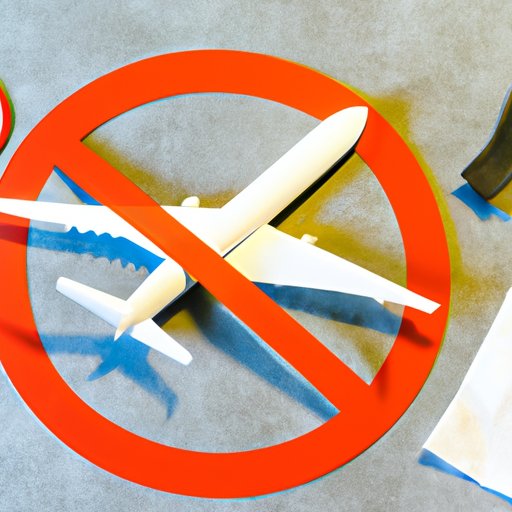
I. Introduction
Traveling by air can be an exciting adventure, but it also entails following strict rules to ensure everyone’s safety. One of the most essential aspects of air travel that travelers often overlook is the list of prohibited items. The Transportation Security Administration (TSA) and other airport security officials strive to enforce these regulations to keep passengers from harm’s way. In this article, we will explore the list of items that travelers cannot bring on a plane, the latest updates to the airport security regulations, and the legal implications of violating these rules.
II. List of Prohibited Items
The TSA has a detailed list of items that are prohibited on planes, and travelers should make sure that they understand the list before packing for air travel. For example, explosives, firearms, and sharp objects like knives, scissors, and razors are prohibited. Lighters, matches, and flammable liquids, including gasoline, are also on the list.
While many of these items seem obvious, some items are less frequently known. For example, hoverboards, self-balancing scooters, and spare lithium-ion batteries are banned from both checked and carry-on luggage because of their known tendency to catch fire. Additionally, many food items such as peanut butter or salsa fall under the liquids regulation and need to be packed carefully so that they don’t exceed the 3.4-ounce limit for liquids.

III. How to Pack Smartly for Your Air Travel
To ensure hassle-free air travel experiences, travelers must pack smartly. Before heading to the airport, it is crucial to follow these tips:
- Check the TSA regulations before packing.
- Pack all liquids in clear, zip-top bags that are under 3.4 ounces.
- Avoid packing prohibited items.
- Avoid packing sharp objects.
- Avoid overpacking bags to ensure that TSA officers can examine luggage quickly.
It’s also crucial to understand why certain items are prohibited. For instance, nail clippers, sewing kits, and knitting needles may not seem like dangerous items, but they can be intimidating and harmful when used as weapons. As such, it is essential to be mindful of the items you carry and to pack appropriately.
IV. Discussing Safety Regulations for Air Travel
Air travel safety regulations are crucial to ensuring the well-being of all passengers. These regulations include carrying certain items in carry-on luggage or checked bags and following specific guidelines while on board. Some of these guidelines include fastening seat belts when instructed and not moving about the cabin in certain stages of the flight.
These regulations are not meant to cause inconvenience but rather to ensure the safety of all passengers and crew. As travelers, we must follow these rules to maintain a secure and organized environment.
V. The Latest Prohibited Items Rules
The TSA regularly updates the list of prohibited items to enhance safety measures. Recently, the TSA allows travelers to bring CBD oil and some medications in carry-on bags, provided that they meet the necessary guidelines. However, travelers are prohibited from carrying dilute bleach or firearm replicas on board.
Travelers must stay informed about these regulations to avoid last-minute surprises at the airport. The TSA website and official app provide updated information that travelers must check regularly.
VI. The Impact of Prohibited Items on Air Travel
Bringing prohibited items on board an airplane puts everyone’s safety in jeopardy. The items’ presence can cause panic, distress, and injuries, leading to delayed flights, canceled events, and a ripple effect on the economy.
Travelers who violate these regulations or are unaware of them can face severe consequences, including fines, criminal charges, and even being placed on a no-fly list. As such, it is essential to be mindful of the items you carry and follow TSA regulations.
VII. The Legal Implications of Prohibited Items
Carrying prohibited items on a flight is a violation of federal law, and consequences vary depending on the item in question. Travelers can face criminal charges if they are caught with firearms, explosives, or other illegal items. They may also face fines and penalties, including being placed on a no-fly list.
To avoid facing these charges, it is crucial to understand the regulations and avoid packing prohibited items.
VIII. Security Tips for Traveling by Air
Several practices can make air travel safe and enjoyable for all passengers:
- Arrive at the airport early to allow time for security checks.
- Do not leave luggage unattended at any time.
- Do not accept packages from strangers, and do not carry items for someone else.
- Be cooperative with security personnel.
- Follow all TSA regulations regarding prohibited items.
By following these tips, passengers can enjoy a safe, secure, and hassle-free air travel experience.
IX. Conclusion
In conclusion, air travel carries several risks that travelers must be aware of before packing for their trips. In this article, we have discussed the list of prohibited items, highlighted safety regulations in air travel, and discussed the legal implications of carrying prohibited items on board. By understanding these regulations and following packing and security tips, passengers can enjoy a safe and successful air travel experience.
As travelers, we must recognize that TSA regulations are in place to ensure all passengers’ safety, and we must abide by them at all times.





